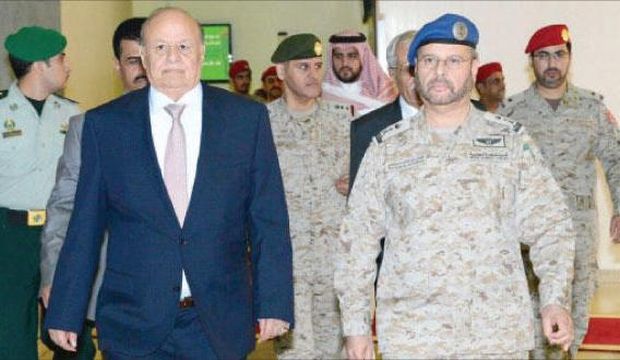
Yemen’s President Abd Rabbuh Mansur Hadi walks during a visit to the Saudi Ministry of Defense in Riyadh, Saudi Arabia, on July 6, 2015. (Saudi Press Agency)
Sana’a and Riyadh, Asharq Al-Awsat—Yemen’s internationally recognized President Abd Rabbuh Mansur Hadi will on Thursday table a 10-day ceasefire proposal to UN Secretary General Ban Ki-moon, to end the fighting currently gripping the country, a diplomatic source said.
Speaking to Asharq Al-Awsat via telephone on Tuesday, the source, who requested anonymity, said the plan would see the ceasefire begin five days before the end of the Muslim holy month of Ramadan, which is expected to end on July 17.
It proposes that all fighting between the Houthi movement currently in control of large parts of Yemen and Hadi loyalists cease for the specified 10-day period.
Hadi, who has been residing in Riyadh since March, will also inform the UN secretary general that the Saudi-led coalition targeting the Houthis in Yemen will also halt airstrikes during the truce. The campaign has been ongoing since late March.
The plan is conditional upon acceptance from the Houthis and ally and ex-president Ali Abdullah Saleh. The Houthis must also agree to allow humanitarian aid to reach different parts of the country. Reports have suggested the group has been blocking the delivery of medicines, food, and supplies to areas under their control and impeding the work of regional and international NGOs.
Hadi will also stipulate that as Yemen’s legitimate and internationally recognized president, he must announce the ceasefire in a televised address to the nation. The Houthis have taken control of several of the country’s media outlets since overrunning Sana’a last September, including local television networks and the country’s official news agency SABA.
The Houthis must also abide by UN Security Council Resolution 2216. The resolution, adopted by the Council in April, stipulates the Iran-backed group must vacate all cities and areas in Yemen currently under their control and cease all hostile action against civilians.
The Saudi-led coalition previously made a ceasefire offer to the Houthis in May. The group accepted the proposal and agreed to the conditions set forth, but immediately began targeting civilians and spreading its militias across different parts of the country again as soon as the truce began.
UN Envoy to Yemen Ismail Ould Cheikh Ahmed is currently in Sana’a to hold talks with the Houthis and representatives of Saleh over a ceasefire in the country. The source said that that the UN and Western countries had been too trusting of the group.
“The new assurances the Houthis and Saleh’s followers have offered remain unclear until now and not known to the legitimate government [led by Hadi]. It is incumbent upon the United Nations, which seems to believe there has been a positive response from the Houthis [to the talks], to reveal these assurances so that they can be clearly seen by the international community,” the source said.
When it came to pushing for the truce, the UN and the international community have put more pressure on Hadi and Yemen’s government than they have on the Houthis, the source said, despite Houthi aggression against civilians, as well as the group’s illegal occupation of large parts of the country and its delaying the delivery of humanitarian aid to those most in need.
Other sources speaking to Asharq Al-Awsat said Yemen’s government last week put forward another ceasefire proposal to the UN, stipulating the international community agree to a joint Arab force to oversee the Houthi withdrawal from cities and regions they have occupied.
The Arab force would also help ensure the country’s security in the coming period until the beleaguered Yemeni army can be reformed, also helping to return people internally displaced due to the conflict in the country.
Meanwhile, a Yemeni source close to the negotiations in Sana’a told Asharq Al-Awsat on Tuesday there had been much “positive progress” on a number of details relating to the Houthis accepting the ceasefire proposal.
The source said an agreement will be reached on the ceasefire within two days and that it will begin on Friday and last for 15–20 days.
“This period should give all sides time to discuss the next steps,” the source said, in reference to restarting a genuine political process in the country, as per the Gulf Initiative accepted by all Yemen’s parties and factions following Saleh’s resignation from the presidency in 2012.
“The expected upcoming talks between the warring Yemeni factions will be different from those that took place in Geneva during the middle of last month,” the source added.
Representatives from Yemen’s government and the Houthis met in June in the Swiss city for UN-sponsored peace talks. No agreement was reached during the meetings.
Nasser Al-Haqbani contributed additional reporting from Riyadh.
